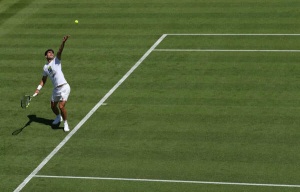NEW YORK -- Just seconds after the Australian Open final had concluded in January, Aryna Sabalenka smashed her racket by her chair on the court in disgust.
Madison Keys had pulled off the upset -- and Sabalenka just missed out on winning her third consecutive title at the major. Her disappointment could be felt through television screens around the world.


Sabalenka had her chance for major glory yet again, just months later, in the final at Roland Garros. She lost there too, this time to Coco Gauff, and she couldn't hide her anger in a postmatch speech and news conference, both of which soon went viral for all the wrong reasons.
Weeks later, at Wimbledon, she fell to Amanda Anisimova in the semifinals in a three-set thriller. She left the court, and the tournament, dejected and confused. She had been the world No. 1 all season and had won two 1000-level titles but simply couldn't get it done when it mattered most. She took some time away from tennis, and tried to reset and learn from everything that had happened throughout the season.
The 27-year-old Sabalenka arrived in New York hungry -- desperate, even -- to redeem her year and conclude her major season by defending her title.
On Saturday, all of the tough losses and the repeated agony of defeat she had felt throughout the season felt worth it. Jason Stacy, her performance coach, said she had started reading a motivational book called "Into the Magic Shop" after Roland Garros. He called it a "fairy-tale thing" -- and, in New York, she had a fairy-tale ending of her own.
Facing Anisimova yet again, although this time in front of a crowd heavily in favor of the American on Arthur Ashe Stadium, Sabalenka claimed her fourth major title with a sometimes turbulent 6-3, 7-6 (3) victory in 94 minutes.
Clinching the title on her third match point, in an otherwise lopsided tiebreak, Sabalenka watched as Anisimova's return went long. She fell to her knees and put her head in her hands, shaking as she sobbed nine months' worth of tears. The crowd jumped to their collective feet and roared under the closed roof. Sabalenka stayed on the ground for several seconds before standing and raising her arms in celebration.
"Those two finals where I completely lost control over my emotions, I just didn't want this to happen again," a beaming Sabalenka said shortly after during an interview on the ESPN broadcast. "And there were a few moments where I was like this close to just letting it go. But I was like, 'Come on now. You cannot do that. You just have to stay focused and keep going, keep trying.' And it's really helped me."
There has never been any doubt about Sabalenka's power or talent, nor her work ethic or ambition.
While never a junior star like many of her peers -- Anisimova won the 2017 US Open girls' title -- Sabalenka achieved success in her early years as a professional and quickly rose up the ranks. By 2018, she had won her first WTA title and was the WTA's Newcomer of the Year. By the following year, she had won her first major title at the US Open in doubles.
But Sabalenka, like so many tennis players, is a perfectionist by nature. She knows how good she can be when at her best and has worked tirelessly in getting her game to be at an elite level. When she struggled with her serve in 2022 -- something that became so crippling on the court that she contemplated retiring -- she brought in a biomechanics expert to help her get past it and to fine-tune her service motion. For many years, she worried about taking too much time off -- a near impossibility in the grueling WTA schedule -- and was hard on herself when she returned to practice if there were any signs of rust.
That dedication has helped lead to astounding success. Since reaching her first major semifinal at Wimbledon in 2021, having switched her focus exclusively to singles earlier that year despite many encouraging her to continue with both, Sabalenka has been arguably the most consistent player on tour. After getting her serving woes under control the following year, she has reached the quarterfinals or better at every major she has played and has advanced to four of the past five finals and all six of the previous hard-court finals. She has held the No. 1 ranking since October and has showed few signs of relinquishing it.
But with all of that has come sky-high levels of expectation, and she has put an even higher degree of pressure on herself. Failing to achieve what she knows she's capable of has led to meltdowns, like the racket-smashing in Melbourne, as well as her speech and comments in Paris. After her 6-7 (5), 6-2, 6-4 loss to Gauff in the French Open final, Sabalenka was in tears, and she later blamed the gusty wind for her performance.
"Conditions were terrible, and she simply was better in these conditions than me," Sabalenka told reporters. "I think it was the worst final I ever played."
Sabalenka was immediately dubbed a sore loser, and some of her other comments about Gauff were even more poorly received by the public. (She later apologized, and Gauff graciously accepted.) Sabalenka and her team then focused on the challenge of how Sabalenka could find a way to win when she wasn't playing her best or the conditions weren't ideal.
Max Mirnyi, a former world doubles No. 1 and six-time major doubles champion from Belarus, joined Sabalenka's team ahead of the hard-court season -- and he has continued to reiterate that lesson throughout their time together.
"One of my main starting lines entering the team and speaking sometimes to Aryna directly is relaying the message that there's no such thing as a perfect tennis match," Mirnyi said Friday. "There's no such thing as perfection on a tennis court. You can take the best matches of [Novak] Djokovic and [Roger] Federer or Steffi Graf ... there will always be some things that didn't go according to plan, and they're the better champions that know how to respond and adjust on the moment, on the go."
It's something her team has been able to contemplate and remind Sabalenka of every time she plays on Ashe, as a placard featuring Billie Jean King's "Pressure is a privilege" is on prominent display by the court's entrance.
The group also reminds her of the second, less-famous, part of King's quote: "Champions adjust."
With King in the stands Saturday, as well as a number of other former tennis champions, including Tracy Austin, Monica Seles, Andy Roddick, Stan Smith and Virginia Wade, Sabalenka did just that.
Newer articles
Older articles
 Gujarat Cricket Association Set to Introduce T20 Tournament in 2025-26 Season
Gujarat Cricket Association Set to Introduce T20 Tournament in 2025-26 Season
 Pant's Explosive Innings Earns Praise from Greg Chappell, Draws Gilchrist Comparisons
Pant's Explosive Innings Earns Praise from Greg Chappell, Draws Gilchrist Comparisons
 India's Harshit Rana Released from Squad Ahead of Second Test vs. England in Birmingham
India's Harshit Rana Released from Squad Ahead of Second Test vs. England in Birmingham
 Prithvi Shaw Admits to Career Downturn: Wrong Choices and Loss of Focus Derailed Cricket Trajectory
Prithvi Shaw Admits to Career Downturn: Wrong Choices and Loss of Focus Derailed Cricket Trajectory
 Asia Cup 2025: September Start Looms as Optimism Surges Despite India-Pakistan Tensions
Asia Cup 2025: September Start Looms as Optimism Surges Despite India-Pakistan Tensions
 Rishabh Pant Redefining Cricket: Greg Chappell Hails Indian Star's Revolutionary Batting
Hoặc
Greg Chappell: Rishabh Pant's Unorthodox Style is Revolutionizing Test Cricket
Rishabh Pant Redefining Cricket: Greg Chappell Hails Indian Star's Revolutionary Batting
Hoặc
Greg Chappell: Rishabh Pant's Unorthodox Style is Revolutionizing Test Cricket
 Wimbledon Serves Up India Strategy: Courts Cricket Fans in Growth Push
Wimbledon Serves Up India Strategy: Courts Cricket Fans in Growth Push
 Bangladesh Opener Shadman Islam Rallies Behind Batters After Day 1 Struggles vs. Sri Lanka
Bangladesh Opener Shadman Islam Rallies Behind Batters After Day 1 Struggles vs. Sri Lanka
 ICC Test Rankings: Pant Soars to Career Best, Bumrah Retains Top Spot, Root Still Leads Batters
ICC Test Rankings: Pant Soars to Career Best, Bumrah Retains Top Spot, Root Still Leads Batters
 Gavaskar Calls for Kuldeep Yadav's Inclusion in Second Test Amid Bumrah Fitness Doubts, Eyes Middle Order Fix
Gavaskar Calls for Kuldeep Yadav's Inclusion in Second Test Amid Bumrah Fitness Doubts, Eyes Middle Order Fix